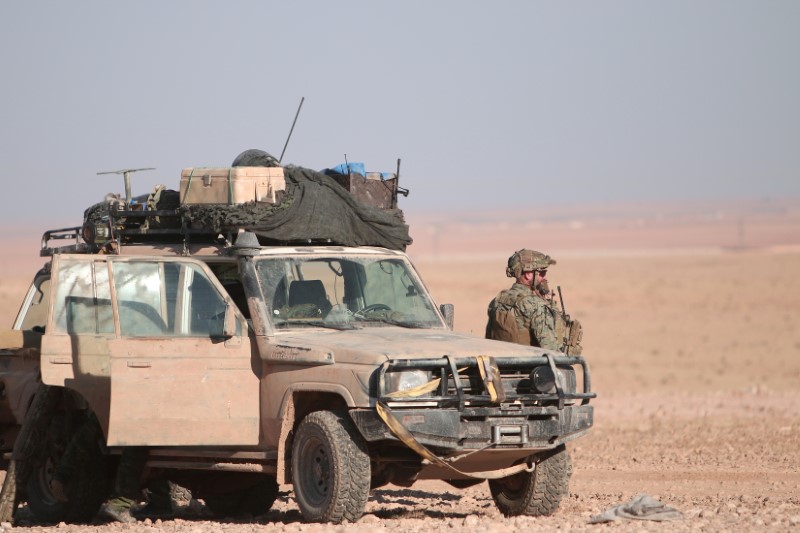
By John Davison
BEIRUT (Reuters) – U.S.-backed forces fighting Islamic State in Syria advanced to within 2 km (1 mile) of a key stronghold near the jihadist group’s de facto capital of Raqqa on Tuesday, and a counter-attack by the militants was repulsed, officials said.
The multi-phased campaign by the Syria Democratic Forces (SDF), backed by air strikes and military advisers from a U.S.-led coalition, ultimately aims to oust Islamic State from Raqqa. IS is also losing ground to U.S.-backed offensives in Iraq.
Officials have given different estimates for how long the campaign will take, and the assault on Raqqa itself appears to have been delayed, after one high-ranking military official said it would begin at the start of April.
Meanwhile the immediate goal is to capture the city of Tabqa, some 40 km (25 miles) west of Raqqa, and a nearby dam on the Euphrates river, an official for the Raqqa campaign said.
“For now, the target in front of our eyes is the city of Tabqa, and the dam,” Gharib Rasho, a media official for the campaign, told Reuters.
He said the SDF had taken control of around 60 percent of the dam, after capturing its northern entrance last month. The SDF is made up of Syrian Arab and Kurdish forces, including a large contingent from the powerful Kurdish YPG militia.
On Tuesday, SDF forces thwarted an Islamic State counter-attack near Tabqa and advanced to within 2 km of the city from the east, an SDF statement said.
Rasho said Islamic State had been trying to break a siege the SDF had imposed on Tabqa by attacking both from inside and from areas to its south which Islamic State still holds.
It is unclear how many Islamic State insurgents remain in Tabqa, but Rasho said they were “few”, based on the estimates of residents fleeing the city.
Thousands of residents have left in recent weeks, though tens of thousands are thought to remain in Tabqa.
The militants were using car bombs, mortar fire and suicide attackers – methods similar to those the jihadists have employed to defend their urban bastion of Mosul in Iraq, he said.
WEEKS OR MONTHS?
Launched in November, the SDF offensive aims initially to isolate Raqqa, Islamic State’s main urban base in Syria. Forces have advanced on the city from the north, east and west. Encircling and capturing Tabqa is a major part of the campaign as the city and dam comprise a strategic base for IS.
The focus on Tabqa does not rule out a simultaneous assault on Raqqa, campaign officials have said.
But that assault appears already to have been delayed as Islamic State resistance keeps forces busy around Tabqa.
The head of the YPG said last month the Raqqa assault would begin at the start of April, and would take no more than a few weeks. The commander of the Raqqa operation, also a YPG official, later said the offensive to capture the city would likely last several months.
U.S. coalition spokesman Colonel John Dorrian said Washington’s partners on the ground would choose when to move in on Raqqa. “Ultimately we are isolating Raqqa and we’re going to, at a time of our partner’s choosing, move in and liberate that city from Daesh (Islamic State),” he said in a statement.
“This is an important task. It’s the equivalent in Syria of what’s being done to eliminate the enemy in Mosul.”
The parallel U.S.-backed Iraqi offensive to drive Islamic State out of Mosul has also taken longer than the Iraqi government predicted. Fighting there rages on between the armed forces and jihadists who are holed up in its Old City.
(Additional reporting by Babak Dehghanpisheh in Baghdad and Ellen Francis in Beirut; Editing by Michael Georgy/Mark Heinrich)









